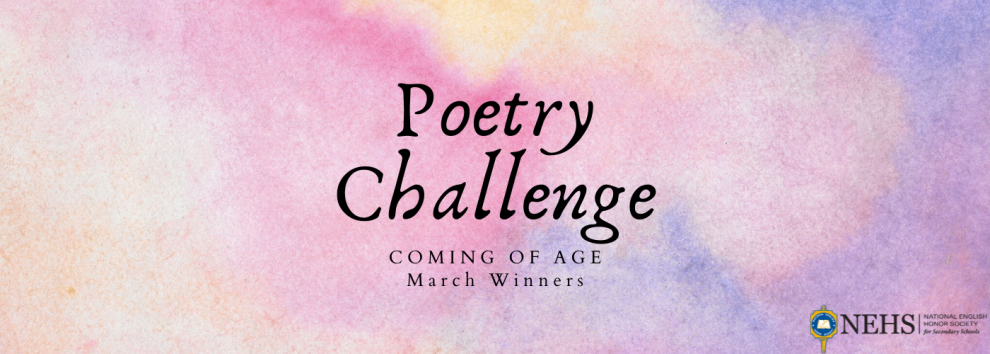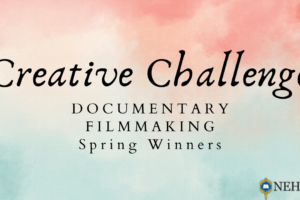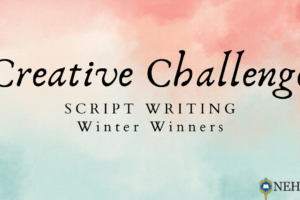about me
Irmak Ersöz
I don’t show you any of my poems because
I only want you to see
the best versions of me,
and all the good ones
are about you.
I don’t know if that’s because you make
everything better
just like magic,
just like the sun bringing flowers out of dirt
and people out of houses
or because more people can relate to
heartbreak
than the very specific trauma I went through
for so long,
or my sister’s bravery.
I don’t want to keep writing you poems or
stories,
I don’t care if no one notices
the thousand canvases I paint all day
or the flowers I secretly grow at night,
it’s worth invisibility to not have you
racing through my mind all the time.
I want to be free of all chains,
I want to wake up in the middle of the night
to go dancing,
not to hallucinate terrifying figures
trying to climb into bed with me.
I choose happy
and I choose life
over you
and over sick.
I don’t believe in wish bones
playing with someone’s bones is disgusting,
and you know all about that.
I wish I didn’t choke saying goodbye
and I wish I didn’t say it every week
because after three days I call you again.
someone fight me for my phone,
someone watch me at night,
I may be an adult
but I need someone
to take care of me like a child
I’m getting sick again
and it has nothing to do with him
stop bringing him up
this is my life
not his.
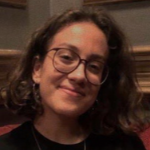 Irmak Ersöz was born on October 27th, 2001, in Istanbul, Turkey. She’s currently in her senior year in Üsküdar American Academy in Istanbul. She is a member of the Practitioners of English Chapter of NEHS in UAA. She has been a literature enthusiast since birth. She has written a metaphysical story (tightrope), a anthology of letters (verse), and multiple poems (about me, the moon, stairs, clouds). She has submitted poetry to the Adroit Magazine in 2018. She doesn’t have a certain poet as a favorite, but she is inspired by the themes of growth and healing the most. Her writing process is very spontaneous; she writes whenever she feels like she has something to say.
Irmak Ersöz was born on October 27th, 2001, in Istanbul, Turkey. She’s currently in her senior year in Üsküdar American Academy in Istanbul. She is a member of the Practitioners of English Chapter of NEHS in UAA. She has been a literature enthusiast since birth. She has written a metaphysical story (tightrope), a anthology of letters (verse), and multiple poems (about me, the moon, stairs, clouds). She has submitted poetry to the Adroit Magazine in 2018. She doesn’t have a certain poet as a favorite, but she is inspired by the themes of growth and healing the most. Her writing process is very spontaneous; she writes whenever she feels like she has something to say.
The Room
Madison Ferguson
I can’t remember when it started, this nightmare-ish recurring dream
It always begins the same way, the same house, same fear, same thundering sky outside
It always pulls me in; this force, this desire that encourages me to explore
My palms start to sweat, my head feels dizzy as I enter the room
Warm and welcoming, clean and neat, this place is not as it seems
I know what to do and I know what I’ll see, but I can’t stop the force pulling me
The windows, which display intimate, vulnerable scenes of my life, fill the room
The first window captures my attention, forces me to watch a toddler who looks just like me
She has bright eyes, curious precociousness, and a joyful smile; she loves to dream
Up movie scenes, and her future, and her life; she is not afraid to explore
Her one fatal flaw, she still believes everything is as it seems
She detects no disparity between what is in and outside
Compelled yet again, I wander off to the next destination to explore
The second window shows me as a little girl of ten, who still loves to dream
She is no longer as naïve as she once was, she knew her father’s luggage outside
Was not simply for a vacation; she knew her mother’s calming words were not as they seemed
She knew there was something more as she peeked out from the door to her room
I turn away in tears, knowing that scared, confused little girl was once me
Next I drift to the window filled with current images of me,
Trapped by her own mind, smothered by others’ expectations, she can’t bear going outside
She longs to fly, to soar, to wander, to explore
Herself and her world, new places, and new people, but this is still just a dream
For love, for fear, for doubt, for despair, her heart has no more room
Her smile, her laugh, her happiness, its fake; she is not who she seems
Trembling, I close my eyes; oh, if I wasn’t trapped in this horrible room
I’m compelled to approach yet another window; a smile escapes from me
She’s in a lovely little town abroad, everyone knows everyone by name; she’s begun to explore
The world and herself too; she does what she loves and says what she means, she no longer dreams
Of the life she wants because she is already living it; she’s the same on the inside and outside
She is who she is unapologetically; she is bold, relentless, fearless; everything is as it seems
Is this what’s in store for me? Will I become her? Is this all just a dream?
My head buzzes with thoughts as I turn to face my final destination; a silver-haired woman looks at me
She has lived her life, and loved it too; she loved so hard it hurt, she has explored
Every square inch of the big wide world and she has turned her heart outside
Of herself; she takes care of her family, her children, her grandchildren; it almost seems
As if she is glowing with love, with joy, with life; she turns to face me, her smile could light up a room
She says in a voice sweet and soft, “Trust me, I know life seems scary from the outside;
Enjoy your life and do what you love; never abandon those lofty dreams and never stop exploring;
There is always more to see, to know, to love; your heart has so much more room than it seems”
 Madison Ferguson is a sixteen-year-old who loves to read and write. When she is not nose-deep in a book, she can be found watching Netflix or jamming out to music with friends. She aspires to travel the world and one day hopes to study abroad. For now, she lives in New Orleans with her parents, brother, and her puppy.
Madison Ferguson is a sixteen-year-old who loves to read and write. When she is not nose-deep in a book, she can be found watching Netflix or jamming out to music with friends. She aspires to travel the world and one day hopes to study abroad. For now, she lives in New Orleans with her parents, brother, and her puppy.
Then and Now
Nicole Golemboski
I enjoyed water gun fights in the soft summer grass with my brother,
where an icy blast would induce shrieks of joy.
Now I hear only of real war and violence and weaponry,
and I wonder which country will construct the latest, most destructive nuclear toy.
The leaves crunched and bugs chirped loudly near my childhood cabin,
where the dense foliage was home to all the secrets of my imagination.
But now I’m plagued by the knowledge that many such magical places are being cut down,
falling victim to the carelessness of ruthless corporations.
My childhood contained contests on the swingset with my friends
to see who could get the highest by pumping their legs the most.
Nowadays people still get high, but on the playground; however,
you couldn’t swing so high that you died of an overdose.
I used to receive comfort and loyalty
from the constant companionship of my ever-present imaginary friend.
Currently though, most people’s imaginary friends are named
Anxiety or Depression and they follow us not to calm, but torture us to no end.
My small body used to drown in my mother’s clothes
as I clomped around in her heels so that I could play house.
My game, however, never used to involve
poverty, abuse, divorce, or an absentee spouse.
In my youth the only corruption that I was acquainted with
was when someone inevitably attempted to change the rules in their game of tag.
Now I am aware of its presence in our government,
politics, and institutions that cause the success of the unlucky to lag.
When I was a child the most hurtful thing one could say was:
“You’re uninvited to my birthday party,” a statement redacted by tomorrow.
That pain pales in comparison to that of cyber bullying and harassment,
which can leave lasting mental scars and cause a lifetime of sorrow.
As a child I would separate my Skittles and eat them in order of my favorite colors,
or divide up my fruit snacks and make them act out a dramatic play.
That being said, I now know that the divide is social, economical,
it is between races, genders, and religions nowadays.
Nothing could beat drinking Swiss Miss hot chocolate after a snow day,
lounging next to the crackling fire in my pink bean bag chair.
Except for now the only warming I’m concerned with is global,
since our atmosphere is presently damaged beyond repair.
I was innocent, carefree, and pure,
a budding flower in a field of boundless opportunity.
Now I am a responsible adult just like everyone else,
a cynical citizen on what I now know to be a doomed earth and a flawed society.
Alas, I suppose this is coming of age.
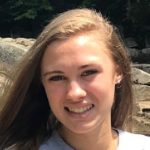 Nikki Golemboski is a junior at Linganore High School in Frederick, MD. This is her first year in the National English Honor Society and she enjoys reading and writing, with much of her inspiration to do so stemming from her motivating teachers and her mother, who is a writer. She enjoys writing and reading poetry because it offers a different way to think and express ideas. When she is not in school she enjoys skiing, playing club volleyball, and doing other outdoor activities like hiking and kayaking.
Nikki Golemboski is a junior at Linganore High School in Frederick, MD. This is her first year in the National English Honor Society and she enjoys reading and writing, with much of her inspiration to do so stemming from her motivating teachers and her mother, who is a writer. She enjoys writing and reading poetry because it offers a different way to think and express ideas. When she is not in school she enjoys skiing, playing club volleyball, and doing other outdoor activities like hiking and kayaking.
The Growing Black Boy’s Interpretation of the Alphabet
Malachi Levy
I knew I wasn’t a little kid
When my connotation for ABC
Wasn’t ABC anymore
It was ABC store
When my older sister nicknamed D wasn’t playful anymore
The boys called her names, “slut,” “whore”
E for everyone
Earning Fs on her Gs
And on her report card got an “H” for held back
I knew I wasn’t a little kid anymore
When my Js weren’t on the court
But in the court of Mr. Racist
Because I was with my friend when he sold some Ks
For his buddy to snort
We took an L
But we bounced back, thinking of making Ms—because we were poor
N’ and we even got to blow Os after we made it out
But no, that ain’t your business, Mr. Crow
So stay on your Ps and Qs
And don’t be a snitch
R you dumb? We haven’t spoke since we were kids
When I was learning about you
You are S stranged to me
Thinking I am gonna spill the T?
To U?
Putting my name in V?
Just to get me caught so you take the W?
Nah
I’m not a little kid anymore
I know your games, Mr. Instituionalizer
I’m all wrapped up, shielded from your tricks
Going for my treasure
Because X marks the spot
There ain’t no asking me Y
But if you pull the guns out
There ain’t no question
I’ll be put to sleep, catching Zs . . .
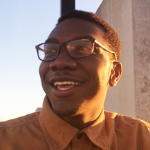 Malachi Levy is an 11th grader at Northwood High School, and a 2nd year member of his school’s National English Honor Society chapter Alpha Beta Gamma. Malachi serves as officer for his school’s NEHS program, being the Peer Tutoring Center Coordinator. Malachi began writing rap songs in the 8th grade after telling his friends that he could “easily” become a famous rapper, and transitioned to poetry writing after being exposed to it by his 9th grade English teacher. Malachi cites his inspiration of writing from his Mother, who is a writer, and his brother, a poet and hip-hop musical artist. Along with his family, Malachi’s favorite poets are Saul Williams, Jahman Hill, Adam Falkner, and Common.
Malachi Levy is an 11th grader at Northwood High School, and a 2nd year member of his school’s National English Honor Society chapter Alpha Beta Gamma. Malachi serves as officer for his school’s NEHS program, being the Peer Tutoring Center Coordinator. Malachi began writing rap songs in the 8th grade after telling his friends that he could “easily” become a famous rapper, and transitioned to poetry writing after being exposed to it by his 9th grade English teacher. Malachi cites his inspiration of writing from his Mother, who is a writer, and his brother, a poet and hip-hop musical artist. Along with his family, Malachi’s favorite poets are Saul Williams, Jahman Hill, Adam Falkner, and Common.
An Adult in a Car Seat:
Christina Medeiros
When I was a kid,
My family would drive around the city to see Christmas lights.
My dad drove my sister and me in his shiny new car to Quiznos,
Got us each Gatorade and a sandwich then drove to River Oaks.
Once we got there, our eyes lit up.
The trees were so large, and the lights were so bright.
There was even a giant angel bigger than all the houses!
The lights around us were enthralling—
They were bigger and brighter than anything I’ve ever seen!
My sister and I would sing songs at the top of our lungs
With my dad’s moon roof wide open.
We’d lift ourselves up as high as we could,
Brush our heads against the roof of the car and say,
“I’m an adult in a car seat!”
Gradually, the sparks started dying.
When I was nine, I graduated from my car seat.
When I was ten, Quiznos closed.
When I was eleven, I began sitting shotgun.
My dad stopped driving us when I was twelve.
For many years, the tradition stopped.
When I was sixteen,
My dad called my sister and me downstairs.
“Let’s go see the Christmas lights,” he said,
And my sister and I immediately lit up.
It will be just like old times, I thought.
Then, my dad gave me the keys.
“What?” I asked, “Am I driving?”
“Yeah,” he replied, “You need some nighttime practice.”
I nod warily before hopping into the car.
At that moment, I realized things were not the same.
As I drove by the Christmas lights, everything seemed smaller.
The giant angel was not so giant, the lights weren’t so bright.
The overpowering trees were now small and dainty.
“Was it always like this?” I asked.
My dad nodded from the passenger seat.
My sister and I were shocked.
“But everything’s so small!” she exclaimed,
“it’s not magical anymore!”
My dad laughed. “it’s brighter than it was, actually.
You girls are just getting older and taller.”
“We’re not old yet,” I protested, “you are.”
My sister rolled her eyes. “You’re the one driving.”
I tried to open the moon roof, but it didn’t open anymore.
The car was no longer shiny and new, it was old and cracked.
I continued to drive throughout the neighborhood,
Admiring the beautiful Christmas lights around us.
A band of little kids sprinted up and down the busy streets
With wide eyes filled with wonder.
They piled into their car and jumped into their car seat.
And then it hit me,
I’m almost eighteen.
If I were to recreate my childhood memories,
I’d practically be an adult in a car seat.
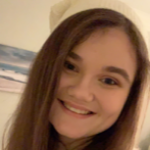 Christina Medeiros is a junior at St. Agnes Academy who has an affinity for reading and writing. She wrote stories since she was a kid, often recreating already popular novels with alternate plots and characters. In her freshman year of high school, she began writing poetry occasionally as a discreet way to communicate her life experiences. She was inspired by many poems throughout her writing career, but her main inspiration is Edgar Allan Poe’s “The Raven” and its unique combination of raw authenticity and conversational eloquence. Recently, she switched from discreet storytelling into narrative free-verse to express her experiences. She hopes her poetry is relatable and interesting to all who read it.
Christina Medeiros is a junior at St. Agnes Academy who has an affinity for reading and writing. She wrote stories since she was a kid, often recreating already popular novels with alternate plots and characters. In her freshman year of high school, she began writing poetry occasionally as a discreet way to communicate her life experiences. She was inspired by many poems throughout her writing career, but her main inspiration is Edgar Allan Poe’s “The Raven” and its unique combination of raw authenticity and conversational eloquence. Recently, she switched from discreet storytelling into narrative free-verse to express her experiences. She hopes her poetry is relatable and interesting to all who read it.
Just an Earth Bound Misfit
Philip Metz
She tosses her hair, eyes unfocused, and muses her finger along the handle of the glass mug.
“It’s crazy to think
That one day your parents put you down
And never picked you back up again.”
All of us at the table watch the idea float around,
Dust in a sunbeam
or
A bubble’s swirling skin
or
Embers popping up from the fireplace
And are borne ceaselessly back to find that last time—
Perhaps my father, music in his hands,
Tossed me to the ceiling like drumsticks,
And after, held me close to his beating chest
So I would forever know the music that could give me flight.
Maybe it was my mother, one arm scooped under me,
My head between her shoulder and neck,
Her other hand wrestling with a bag and my sister’s hand;
Whispering thank you to the gym’s kid zone operator.
Snapped into the car seat
And magically whisked into my bed the next second.
She sighs and looks at us around the table, but we’re watching
Little tumbleweeds of labels trundle across its surface
As we pick at the adhesive on our bottles. The quiet opens,
“I guess we never know . . . ”
And closes again.
We all go back in time again,
But Maria sits with herself.
And gazes down at a stroller
Where he’s sleeping.
Somewhere in the future,
“You’re home! You’re home!”
“That’s right, big guy! Ready for liftoff? 3-2-1! Go!”
And she would lift him as high as she could
Dust in a sunbeam
His giggle, a generous sprinkle of fairy dust.
Soft wisps of hair blown back by flight
“Oooof, Buddy!
You’re getting so big and strong!
PERMISSION TO LAND?”
“Ok, Mommy!”
Dust settling to the ground.
That night, Maria carries him with her all over the house,
Walking from room to room, refusing to lay him down
For even a moment.
She sleeps with him splayed across her chest;
Their hearts pulse harmoniously close to each other.
So close and loud that he sleeps and drifts endlessly safe
And so perfect that she is finally able to ignore the splash of seconds
Throwing themselves from the wall and across her floor
To settle among the dust bunnies under her bed.
 Philip “Pj” Metz is an English teacher at Bishop Moore Catholic in Orlando, FL, and is the Adviser for the Bishop Thomas J. Grady Chapter of NEHS. He has taught English for ten years, including two years teaching ESOL in Busan, South Korea. He is a published poet and finds joy in encouraging his students to experience and create new works in his class every day. Pj’s favorite poets include Shay Alexi, Terrance Hayes, and Emily Dickinson.
Philip “Pj” Metz is an English teacher at Bishop Moore Catholic in Orlando, FL, and is the Adviser for the Bishop Thomas J. Grady Chapter of NEHS. He has taught English for ten years, including two years teaching ESOL in Busan, South Korea. He is a published poet and finds joy in encouraging his students to experience and create new works in his class every day. Pj’s favorite poets include Shay Alexi, Terrance Hayes, and Emily Dickinson.
Hey, Snowflake
Audrey Nagel-Schoonmaker
That name you wear with pride—
thinking you’re unique,
brightly beautiful, and pristine—
is an apt insult, you know.
Your crystalline character is your own,
until you drift onto the graying roadside heap
pile onto all your fellow flakes, fold at the edges,
and form the ubiquitous slushy masses of which,
by March, the waning winter is weary.
Your brilliance is only the reflected light of other suns,
and when corrected of your fallacy,
you melt with weeping and whining,
your skin as thin as April ice,
weakening at others’ words,
cracking under the slightest stress.
You’re turning colder, Snowflake,
but I know these things are true
because I was once like you,
certain I was special, unique
brightly beautiful, and pristine.
Yet, in my Autumn, I realize I’m not snow, but earth,
rock and clay: not pretty, but strong—
the stuff of which mountains are made.
I’ve weathered your slushpile sophistry,
and under the rain of your turbulent tears,
my dirty surface washes clean—
a little more so, every year.
My bedrock welcomes any who seek to dig there
and take succor from experience interred—
including you, too, Snowflake, should you seek it—
for what’s a little cold rain on the mountainside?
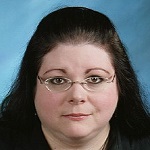 Audrey Nagel-Schoonmaker is the Lead Advisor of the Cardinal Letter Society, Antioch Community High School’s (ACHS) chapter of NEHS. She has been teaching for 25 years, 21 at ACHS, and is recently National Board certified. She is proudest of creating both the curriculum for her school’s Creative Writing course, and initiating/creating the Creative Writing Advanced course after seeing a desire in her students for a place to further their love of writing—and to receive credit for it. Audrey loves dark, lyrical poetry such as Edgar Allen Poe’s, and her favorite thing about writing poetry is the language play: finding just the right word, just the right rhythm, to express her ideas. She writes alongside her students in Creative Writing classes because she wants to foster a writers’ community for all who enjoy the art form.
Audrey Nagel-Schoonmaker is the Lead Advisor of the Cardinal Letter Society, Antioch Community High School’s (ACHS) chapter of NEHS. She has been teaching for 25 years, 21 at ACHS, and is recently National Board certified. She is proudest of creating both the curriculum for her school’s Creative Writing course, and initiating/creating the Creative Writing Advanced course after seeing a desire in her students for a place to further their love of writing—and to receive credit for it. Audrey loves dark, lyrical poetry such as Edgar Allen Poe’s, and her favorite thing about writing poetry is the language play: finding just the right word, just the right rhythm, to express her ideas. She writes alongside her students in Creative Writing classes because she wants to foster a writers’ community for all who enjoy the art form.
“As You Like It”
Natalie Rebetsky
“All the world’s a stage,
And all the men and women merely players,
They have their exits and entrances,
And one woman in her time plays many parts.”
1
We tame/wild teenagers lived
By my mother’s unwritten rule:
What she didn’t know, didn’t count.
Four decades later, I am a grandmother.
Still, my teenage heart can’t tell her about
The night we spent running from the police,
Scattering in the white light that lit
Up the woods, our Arden, where boys and girls
Met and blended into shadows, seeking
The pleasure of being someone else.
2
That spring, we sat at our desks,
Half attending in AP literature,
Dutifully deciphering Jacque’s
Word puzzle, the clever only to
The English teacher Shakespearean imagery,
While the fairy-dusted, pollinated air
Moved us by a spell stronger
Than words.
Self in center,
We saw our bodies metamorphosing
From the second to the third age. Our stage
A final crossing with tassel and robe.
Complete.
3
In the heat of June,
We skipped the last school day
(another unmade confession)
And drove to the mountains.
Daydreaming on sunny rocks
Perched above the forest falls,
Ann said lightly, “I predict
You will be the first
To get divorced.”
It stung.
And, in an age, it was true.
4
It still stings,
As, ages later, I see my
ghostly reflection in the computer screen,
Eyes narrowed, without my reading glasses,
At the too-small words of this poem.
I’m happier mated, but marked,
Compared to my high school tribe
Who faithfully Facebook silver anniversaries,
Filtered to hide their flaws.
My sagging soft wilting peach flesh,
Over ripened and unmasked,
Mocks me in the bathroom mirror.
The coming of my age is nothing short of alarming.
No rejuvenating cream can erase
This history of choices,
The sun and baby oil burns.
The wine and song
Have turned down my mouth
Edges into a stranger reflection of the girl
I am still inside.
 Natalie Rebetsky is Advisor of the Linganore NEHS chapter and Lancer Media, the school’s award-winning newspaper. She has been teaching high school and community college courses for more than 30 years. Teaching was always her “dream job,” even though inspiring learning is more than a full-time occupation. She received some advice from a college admissions counselor that has always stuck with her: “Having a fall-back plan means you must be thinking you might fail. Don’t give yourself that excuse.”
Natalie Rebetsky is Advisor of the Linganore NEHS chapter and Lancer Media, the school’s award-winning newspaper. She has been teaching high school and community college courses for more than 30 years. Teaching was always her “dream job,” even though inspiring learning is more than a full-time occupation. She received some advice from a college admissions counselor that has always stuck with her: “Having a fall-back plan means you must be thinking you might fail. Don’t give yourself that excuse.”
Metaphor Morning
Scott Richburg
Our son is reading his required book,
Finding similes and metaphors
Tucked away like lace handkerchiefs
In abandoned rooms full of webs.
His next task: To invent fresh ways
To talk about what’s been talked to death.
Mysterious as a metaphor himself,
He muses in swirling halos of fire
In the threshold to the sunny outside,
A brown wispy stalk bursting with sap,
Sharing each labored word he writes
As if barefooting through broken glass.
When I ask about paths of least resistance,
A cliché stuffed in a figurative husk,
He sulks, “Can’t I just say ‘the treehouse
Is like a stick’ and be done?”
Shattering zombie skulls into confetti
Gleams in the spinning whorls of his eyes.
He nosedives off the cliffs he creates,
His metaphor-making a parachute all its own—
If not so intense, not so profound—
I sigh, petrifying where I recline, old lizard:
“Summer’s flying toward loss, son,
Like the right word left unsaid.”
Satisfied with what he thinks I meant,
He sinks again into cool shadows,
Like a koi teasing the sun.
 Scott Richburg has been writing his entire adult life and has no plans of doing otherwise. A private-school literature and writing teacher, Richburg has been published in a number of small publications—most recently The Birmingham Arts Journal—and has received a handful of literary prizes including Sigma Tau Delta’s New Teacher Essay Award. His current projects: A book of essays chronicling his family’s ordeal with Chronic Lyme Disease and a collection of stories inspired by the Minotaur and his Labyrinth. Richburg lives in a small Alabama town just outside of Montgomery, where he, his wife, his son, and their two dogs happily keep house.
Scott Richburg has been writing his entire adult life and has no plans of doing otherwise. A private-school literature and writing teacher, Richburg has been published in a number of small publications—most recently The Birmingham Arts Journal—and has received a handful of literary prizes including Sigma Tau Delta’s New Teacher Essay Award. His current projects: A book of essays chronicling his family’s ordeal with Chronic Lyme Disease and a collection of stories inspired by the Minotaur and his Labyrinth. Richburg lives in a small Alabama town just outside of Montgomery, where he, his wife, his son, and their two dogs happily keep house.


